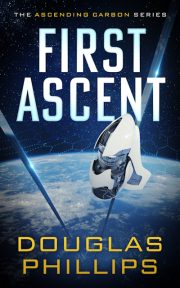An Interview with Jason Heller
by Cat Rambo
 Jason Heller is the nonfiction editor of Clarkesworld Magazine. His nonfiction has appeared in The A.V. Club, where he’s a regular contributor, as well as Weird Tales, Fantasy Magazine, and Tor.com. His debut novel, Taft 2012, was published in January by Quirk Books; it will be followed later this year by the first book in a middle-grade horror series (to be announced). He’s also the author of The Captain Jack Sparrow Handbook, and his short stories have appeared in Apex Magazine, Sybil’s Garage, Brain Harvest, Polluto, M-Brane SF, and many others.
Jason Heller is the nonfiction editor of Clarkesworld Magazine. His nonfiction has appeared in The A.V. Club, where he’s a regular contributor, as well as Weird Tales, Fantasy Magazine, and Tor.com. His debut novel, Taft 2012, was published in January by Quirk Books; it will be followed later this year by the first book in a middle-grade horror series (to be announced). He’s also the author of The Captain Jack Sparrow Handbook, and his short stories have appeared in Apex Magazine, Sybil’s Garage, Brain Harvest, Polluto, M-Brane SF, and many others.
Writing about Taft was not your idea, but Stephen Segal’s. What anxieties did you have about writing a first novel based on someone else’s idea?
There were definitely some worries on my part, but they were far outweighed by the positives. Stephen, then an editor for Quirk, approached me his concept for Taft 2012 after I’d written The Captain Jack Sparrow Handbook for him (and before that, done some nonfiction for him at Weird Tales). Captain Jack taught me a couple encouraging things: A) that working with someone else’s idea and/or an established property could still be an opportunity to be creative, and B) that Stephen and I had great synergy, work-wise.
As reassuring as those things were, my first reaction was to turn the project down. I’d already been working on an original, dark science-fantasy novel of my own, one couldn’t be more different than Taft 2012, and I was concerned that I might be giving the world the wrong first impression about my identity as an author.
At the same time, I feel I’m pretty versatile as a writer—and in fact, unknown to Stephen at the time, I’d previously written a couple of lighter, somewhat satirical speculative-fiction stories involving contemporary electoral politics and the presidency. Taft 2012 wasn’t outside my wheelhouse, just over in a far corner of it. Of course, I was also thrilled by this unique opportunity; in essence I was given on-the-job training while completing my debut novel.
My biggest worry, though, was the most obvious one: That I wouldn’t be taken seriously as a novelist since the original idea for my debut wasn’t mine. But as the project evolved, and I began to expand Stephen’s core concept into so many different dimensions, I felt a lot more comfortable owning Taft 2012. Still, if it had been up to me, Stephen’s name would have been on the front cover along with mine. He’s a brilliant guy, and I can’t thank him enough.
What did Stephen end up thinking of the book?
Oh my god, I can only hope he likes it… I mean, he says he does, so I have to take his word for it!
I felt a great obligation to make Taft 2012 live up to the spirit of his vision. I mean, this isn’t Crime and Punishment here, but there’s no denying how clever and savvy an idea Taft 2012 is (and I say that with all due credit aimed at Stephen). Fleshing out his page-long proposal into a 260-page book wasn’t easy—and I can’t stress enough how vital and extensive Stephen’s input was throughout the entire process—but I think he’s proud of this weird little book.
In writing Taft 2012, you researched Taft era politics – what similarities did you notice to our own political scene?
The parallels are downright eerie. Ideological tensions within the GOP. Battles over taxes (Taft was in office when the 16th Amendment establishing the federal income tax was ratified). Fears about corporate influence over the political process. Preservation of the environment versus the interests of commerce. Race relations. The pros and cons of regulation. How active a role the U.S. should take in world affairs. These were all dominant issues during Taft’s time, as they are today.
The more I researched, the more it seemed that Taft was going to find 2012 to be very similar to 1912—even as he obviously was going to struggle in the attempt to adjust to all the radical changes that have occurred over the last century. In the book, I was definitely trying to make a subtle point about things changing, things staying the same, and whether we as a society are perceptive enough to realize that our problems are not in any way new.
That said, we’re talking satire here, so I wanted to make sure this was all done with a wink and a poke. Believe it or not, I’m actually more optimistic about the American political system after writing Taft 2012 than I was beforehand.
How worried were you about the 2012 election season proceeding in a way that would somehow make the book less pertinent to today’s politics?
That was a huge concern. I wrote the book between the summers of 2010 and 2011, yet the bulk of the story takes place in late 2011 and 2012. I decided to make the story, well, fuzzy in certain ways in order to avoid the glaring omissions that were sure to pop up in the real-world 2012 race.
For instance, in the book, Taft doesn’t name any of his competitors in the presidential race—after all, in the summer of 2011, I had no way of knowing exactly who would be in the race by the time 2012 rolled around. Besides President Obama, of course.
But even then, it would have been lopsided if Taft constantly mentioned Obama by name without mentioning the GOP candidates by name. In a sense, I’m glad this limitation popped up. It gave me the chance to be little less of a political wonk, which I think would have made Taft 2012 a less fun read, and turn the book into more of a character-driven romp.
Are there other historical figures that may pop up in your forthcoming fiction?
Hell no! As proud as I am of Taft 2012, my natural inclination has always been toward secondary-world fantasy (and science-fantasy). I love worldbuilding. I love using symbolic and metaphorical social constructions to exaggerate and concentrate the issues we deal with in the real world. I love being able to craft a setting from scratch—and then use that setting to be simultaneously escapist and relevant to the here and now.
More importantly, though, I hate having to stick to the facts. When you build your own world, you play by your own rules. Granted, you have to maintain an internal logic and continuity in a world of your own device. Actually, screw that, you don’t really have to do that either! If my hero Michael Moorcock can break that rule, maybe there’s a slim chance my barely talented ass can get away with it too.
If not, I’ll have a fun time failing in the attempt. But no, no more alternate history for me. That is, unless another great editor happens to approach me with a particularly promising idea…
The book’s made up of a combination of documents, including the Twitter stream of a Taft still mastering the 140 character limits, Craiglist discussions of Taft spottings, Secret Service Incidence Reports as they accompany their assignment “Big Boy,” and Fox News polls. What were the hardest to write?
The hardest were probably the transcripts of the Department of Home Security surveillance footage. More specifically, the covert recording of the men using the public urinals at one of Taft’s major campaign events. And it was difficult mostly because I was really cracking myself up while writing them.
Who are the fiction writers who influenced you and helped shape Taft?
When it comes to the darker speculative fiction that I write, my influences are more along the lines of J. G. Ballard, Michael Moorcock, Gene Wolfe, and M. John Harrison. Of course, those authors had zero influence whatsoever on Taft 2012.
Honestly, I’m not sure where all this goofy stuff came from. Certainly I grew up reading satirists like Joseph Heller (no relation), Mark Twain, and Kurt Vonnegut, although I have to admit I haven’t read any of those authors in ages (Taft does get a mention in Bluebeard, however, if I remember correctly).
Maybe the one writer that ties everything together is Douglas Adams, whose sense of the morbid and absurd played irreparable havoc with my 13-year brain.
Does Taft have an accompanying music playlist/Taft mixtape?
I’m a huge music fan, and I usually do make playlists for pieces of fiction I’m writing. (In fact, in one of my earlier presidential-SF stories, a disgraced, fictional former president in the future joins the teenage punk-rock band that practices in her basement.)
With Taft 2012, though, it was hard to think along those lines. I love music of all genres and eras, but the popular music of Taft’s time goes beyond even my wide threshold. Ragtime was huge.
But the commerce and culture of recorded music didn’t operate the same way then as it does today; songs were more famous than the artists who sang them, and music fans were more apt to buy sheet music (and play the song themselves at home) than a gramophone record. The vast majority of the innovations in jazz happening at the time were criminally undocumented. I’m not much of a classical guy, but surely Taft enjoyed some of the contemporary composers of his day. Personally, I probably listened to a lot of death metal while writing the book.
What prompted you to come up with the presidential ID code that allows Taft to identify himself, and how nervous are you about exposing government secrets like that?
If I remember correctly, that was Stephen’s idea—one of the many brilliant ones he had during the book’s gestation. A lot of liberties had to be taken with things like presidential procedures and protocol (for instance, in Taft 2012, the government apparently and inexplicably had the incredible foresight to preserve a sample of Taft’s tissue, enabling a DNA test in 2011 confirming his identity).
I love these weird little details that pop up throughout the book—the less plausible, the better. Not only do I get a mischievous joy out of the ridiculous (again, thank you, Douglas Adams), I think it helped establish the baseline of weirdness and unreality that Taft 2012 was going to follow.
Tell me about Irene and her real life model.
In the book, Irene Kaye is a woman born in 1906 who wrote Taft a postcard just before his disappearance in 1912. When he returns, she’s still alive and living in a retirement village. They reconnect—and she becomes Taft’s only living link to his own time, as well as his moral compass to a certain degree.
I dedicated Taft 2012 to my late grandmother, Margaret Smith, and the character of Irene is based on her. My grandmother was a lovely, generous, incredible woman, and she raised my brother and I just as much as our mom did. She just breathed history, and my fascination with the past definitely came from her.
She also was the first person to encourage me to write; at the age of five I was scribbling poems for her. Sadly, she didn’t live long enough to see any of my achievements (modest as they are) as a writer. But I believe she knew all along that I needed to be pointed in that direction, and in that sense, Taft 2012 wouldn’t have existed without her. Nor, of course, would I.
(After the book was finished, I realized this tidbit of synchronicity: My grandmother was born November 3, 1912, the week Taft lost reelection to Woodrow Wilson. Neat, that.)
Where can fans of Taft 2012 find more of your work?
I keep a blog at www.jasonmheller@blogspot.com and a website at www.jason-heller.com. I usually update them with news of recent publications (and a list of previous short stories, including stuff in Apex Magazine and Sybil’s Garage). Most of my pop-culture journalism runs at www.avclub.com. Also, I’m on Facebook way, way too much, obsessively leaving a breadcrumb trail of neurotic rambling that some shrink ought to have a field day with someday.
What’s upcoming and is it equally politically loaded?
I’m working on two book-length projects right now, and each is politically loaded in its own way: One is a post-apocalyptic YA series that explores class hierarchies in a vast, biomechanical, walking city; the other is a standalone novel for adults that’s kind of a post-steampunk pastiche of Moby-Dick and Dune. The latter focuses far more on organized religion than politics, but of course the two are inseparable. No real-world stuff, though!
After the 2012 election cycle runs its course, I hope to retreat into my twisted psyche to dwell in the weird worlds of my own creation for a couple years. If not forever.
•••
 Find Cat Rambo’s fiction, which includes over a hundred published stories, at her website. She teaches at Bellevue College as well as via online workshops and serves as a volunteer with Clarion West. Her most recent publication is her short story collection for Kindle and other e-readers. She is the editor GoH at MidSouthCon this March.
Find Cat Rambo’s fiction, which includes over a hundred published stories, at her website. She teaches at Bellevue College as well as via online workshops and serves as a volunteer with Clarion West. Her most recent publication is her short story collection for Kindle and other e-readers. She is the editor GoH at MidSouthCon this March.

